When it comes to gauging the health of the global economy and its impact on financial markets, few indices are as telling as the Dow Jones Industrial Average (DJIA). This venerable stock index not only represents the might of American industry but also reacts sensitively to economic signals from across the globe. Understanding how the Dow responds to international affairs can offer investors crucial insights into the mechanics that drive market movements and shape investment strategies.
Trade Agreements and Tensions
Global trade dynamics play a significant role in shaping the Dow. Events such as the signing of new trade agreements or the imposition of tariffs can have immediate and tangible impacts on the index. For example, the North American Free Trade Agreement’s (NAFTA) replacement with the United States-Mexico-Canada Agreement (USMCA) had significant implications for companies within the Dow, many of which have a large stake in cross-border trade.
- United States Trade Representative – USMCA: USMCA
Monetary Policies of Central Banks
The monetary policies of central banks worldwide, especially those of the Federal Reserve (Fed), European Central Bank (ECB), and Bank of Japan (BOJ), can also affect the Dow. Interest rate decisions, quantitative easing measures, and inflation targeting are all keenly watched by investors as they influence the cost of capital and can drive capital flows between markets, affecting multinational companies on the Dow.
- Federal Reserve: Federal Reserve
- European Central Bank: ECB
- Bank of Japan: BOJ
Political Instability and Geopolitical Events
The Dow often reacts to political instability and geopolitical events. Elections, political crises, and international conflicts can lead to uncertainty, which equates to volatility in the financial markets. An example is the effect that tensions on the Korean Peninsula or in the Middle East can have on global oil prices, indirectly influencing energy and transportation stocks within the Dow.
Technological Innovation and Competition
Technological advancements and competition, particularly from Asia’s fast-growing markets, can create both opportunities and challenges for companies on the Dow. The competition can erode market share and profitability, whereas successful innovation can open new revenue streams and markets. Investors monitor these developments closely as they can have long-term implications for stock valuations.
Emerging Market Economies
Finally, the performance of emerging markets is a significant indicator that investors use to predict the direction of the Dow. Growth rates, consumer demand, and economic policies in countries such as China, India, and Brazil can profoundly influence the business prospects of companies on the Dow that are increasingly reliant on global demand.
- World Bank – Emerging Markets: World Bank
Conclusion: A Matrix of Global Influence
The Dow Jones Industrial Average serves as a financial prism, refracting the myriad economic signals of our interconnected world. By paying close attention to international trade dynamics, central bank policies, political events, technological trends, and the rise of emerging markets, astute investors can anticipate and react to the ripples that run through the markets. In the fluid realm of global economics, those who keenly watch and interpret these signals can better navigate the movements of the Dow and, by extension, the broader investment landscape.




 AGF-B.CO
AGF-B.CO